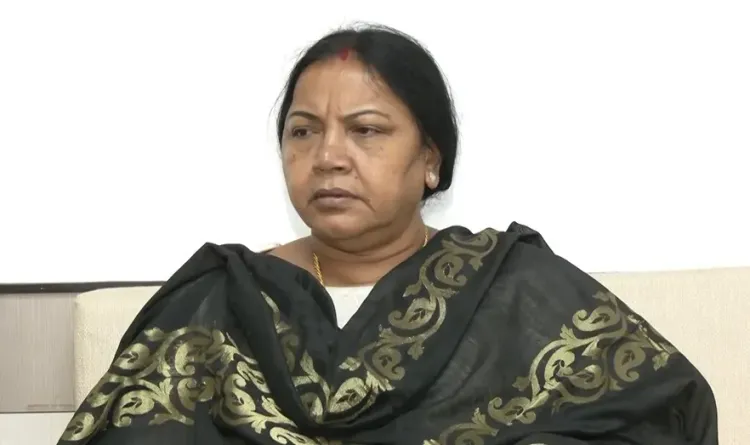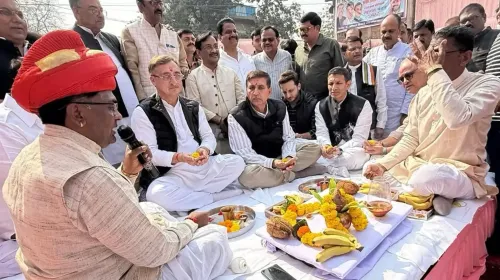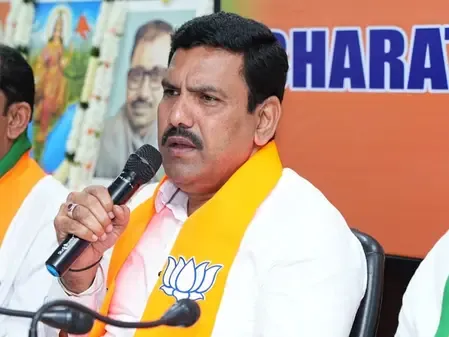Is My Daughter Safe in Bengal? NCW's Archana Majumdar Questions Kolkata Law College Gangrape Incident

Synopsis
Key Takeaways
- Archana Majumdar raises serious concerns about women's safety in West Bengal.
- NCW's commitment to justice and support for victims.
- Criticism of police response highlights systemic issues.
- Broader implications of gender-based violence in the region.
- Need for urgent reforms in law enforcement and societal attitudes.
New Delhi, June 30 (NationPress) National Commission for Women (NCW) member Archana Majumdar has spoken out against the alarming decline in law and order in West Bengal, following the recent gangrape of a student at a law college in Kolkata. She voiced her profound concerns regarding the safety of women in the region, confessing that even she fears for her own daughter's security.
In an interview with IANS, Majumdar stated: "As a member of the NCW, a mother, and a voter of Bengal, I believe that my daughter is not safe in West Bengal."
The NCW has initiated suo motu cognizance concerning the Kolkata Law College gangrape case, and Majumdar visited West Bengal on Sunday to meet the victim and her family. Unfortunately, she was hindered by what she termed a troubling lack of cooperation from the police and local authorities.
"I was in West Bengal yesterday. Despite adhering to all formal procedures and maintaining constant communication with the nodal officer, I could not access the victim or her family. The police claimed they were unaware of the family's whereabouts, stating they were no longer within their jurisdiction," Majumdar disclosed.
She emphasized: "If the Deputy Commissioner or nodal officer genuinely does not know the victim’s family location, then it signifies a total failure of the police. Their duty is to guarantee the safety of the victim and her family. If they do know but are withholding information, it indicates dishonesty — both scenarios are deeply concerning. The police must be held accountable."
Majumdar underscored that the NCW will persist in pursuing the matter.
“We are reaching out to the relevant authorities. We have officially noted this and will ensure responsibility,” she asserted.
Majumdar linked this incident to a larger issue of gender-based violence in West Bengal, referencing a series of recent notorious cases such as the RG Kar College incident, the Sandeshkhali atrocities, and other reported events from Arijikore and Nadia.
"These horrifying events are occurring one after another. Rape and murder incidents have become alarmingly prevalent in nearly every district of Bengal. The tragic reality is that the offenders are seldom punished — they are often protected by the police and the administration," she remarked to IANS.
Detailing her visit to the crime scene at Kolkata Law College, Majumdar recalled: "We attempted to access the college premises, but it was a farce. The entire stairway and elevator were locked. We were denied entry. This is not merely a lack of cooperation — it’s obstruction. It is unacceptable that even a constitutional body like the NCW faces such barriers."
She further stated: "Our Constitution does not permit such treatment of constitutional bodies. The NCW was established to protect and advocate for women's rights and welfare. When we are obstructed, it conveys a dangerous message — that institutional support for women is being actively suppressed."
Majumdar strongly criticized the West Bengal government, accusing it of failing to deliver justice in instances of crimes against women.
"Under Chief Minister Mamata Banerjee’s administration, rapists and other criminals remain at large. The state government has failed to enforce punishment. Law and order appear to be applied selectively — not against criminals, but to protect them. The police and administration have turned into their shield," she asserted. "The phrase ‘justice delayed is justice denied’ is particularly relevant here. Rapists and traffickers are emboldened because they know there will be no repercussions for their actions. They perceive the government and police as their allies, acting with impunity."
Majumdar described the circumstances surrounding the Kolkata Law College gangrape as profoundly alarming.
"Can you imagine — a student was gangraped by her seniors and classmates in a college room, in broad daylight. I have seen the location. It’s a small room — 100 to 150 square feet. Other individuals were nearby. It’s implausible that no one heard anything. Yet, no one intervened to stop it," she remarked.
She contended that such audacity can only exist when perpetrators feel protected.
"When the rapists hold political influence, no one dares to step in. That’s the harsh reality of colleges in West Bengal today. Leaders of the ruling party — especially their student factions — dominate everything, from faculty to administration to admissions. It’s all part of a money-driven power structure linked to the ruling party. That’s why they remain unpunished."
Majumdar painted a somber picture of women's safety in Bengal.
"Day by day, crimes against women are escalating — rape, murder, acid attacks, human trafficking, missing girls. These offenses are either underreported, delayed in judicial processes, or simply ignored. No strong message is being conveyed to the criminals," she noted.
"The offenders do not fear the law because they know they will be shielded. This mentality stems from a long-term failure to punish wrongdoers."
She reaffirmed the NCW’s commitment to supporting the victim and her family.
"We are resolved to stand by the victim. That is our responsibility and mandate as a commission. We will do everything in our power to ensure that justice is achieved," she stated.
In a heartfelt reflection, Majumdar expressed: "It's heartbreaking for me to admit this — not just as an NCW member, but as a mother and citizen of Bengal — that even my daughter is not safe in this state today. If this is how unsafe we feel, consider the plight of the average woman. Change is essential."









